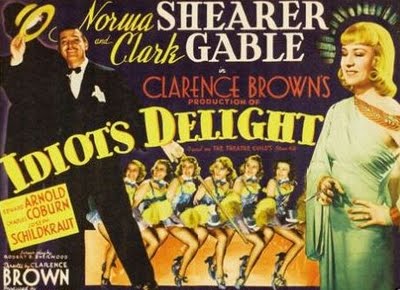
IDIOT'S DELIGHT
US, 1939, 107 minutes, Black and white.
Clark Gable, Norma Shearer, Edward Arnold, Joseph Schildkraut, Charles Coburn, Burgess Meredith.
Directed by Clarence Brown.
A dated but likeable comedy-romance. Directed by Clarence Brown with his customary taste (Garbo's favourite director, plus a range of social comedies during the thirties and such films as The Yearling and National Velvet in the forties), the film is based on a play by Pulitzer Prize-winner, Robert Sherwood (The Petrified Forest). The screenplay was written by Robert Ardrey, a writer over many decades at M.G.M. who branched out into anthropology and philosophical writing in the sixties.
The film has Clark Gable's starring role just prior to Gone With The Wind. He shows his customary charm and has an opportunity to do a song and dance routine to Puttin' On The Ritz (incorporated into That's Entertainment). Norma Shearer has an interesting role as a woman trying to impersonate continental aristocracy. Edward Arnold and Charles Coburn give customary solid performances and there is an early performance by Burgess Meredith. It is interesting that the film was made prior to the start of World War II - which it anticipated with some feeling. For this reason it in an interesting film historically to gauge something of American reaction to Hitler prior to World War II.
1. A teaming of Clark Gable and Norma Shearer in the thirties - charm, style, comedy, romance? The film with solid production values, taste and style?
2. Black and white photography, the presentation of America, Europe (American style)? Score, song and dance routines? sentiment?
3. The work of Robert Sherwood, theatre, Pulitzer Prize? His pacifist stances? His anticipation of World War II and his warnings?
4. The background of World War I for the opening, the disruption to people's lives, peace and demobilising? The difficulty of getting jobs? Harry and the collage of his attempts to get jobs during the twenties? Harry at liberty? The background of Prohibition, burlesque, chorus work? Burlesque show and the mind reading? Disasters with alcoholic mind readers? The troupe and Les Blondes? The development from the twenties into the thirties and the way this was quickly communicated?
5. Harry and the war, the Clark Gable hero, seedy background, attempts to get jobs, with Madame Zuleika, her confidence tricks? his learning the trade? success in moving to Europe with the girls, his manner, ability to handle situations? The tone about the ordinary average American and his being drawn into politics? Decisions? An engaging Clark Gable role?
6. The encounter of Harry and Irene ? her prompting, Madame Zuleika, wanting to learn the code, her ravenous eating of the meal, her visiting his room to learn more? Their romance? The tenderness of the farewell and the gift at the station? Harry's surprise at her later reappearance? His attempts to penetrate her disguise and try to be sure? The various tactics and the dancing, the talking, the Russian song? The reunion at the end?
7. Irene and the glimpse of her after the war - ambitious, charming? encountering her later with her blonde hair, wealth, aristocratic style? her being in partnership with Achille? her incessant chatter, her patronising people, commenting on the views? The irony of her fight with Achille about the guns? Her interaction with the group in the hotel? Her being abandoned by Achille? The cat and mouse tricks with Harry? The revelation of the truth? The breaking through the affectation? The love for each other and mutual help? The final singing and the rhetorical speech about the little people at the outbreak of the European war?
8. America and Europe and war in 1938-1939? The remoteness of Europe and prospects of war? The Americans in Europe and their carefree attitudes? Encountering difficulties with trains, passports? The planes and the bombing raids? The bombing of the hotel? Defiance, hopes? promoting courage and stances prior to war's breaking out? to avoid it?
9. Achille and what he represented in terms of power, manipulation, wealth, arms? his leaving when the bombs fell? Tur and his cancer research, his German loyalties and giving his talent to the war effort? The young pacifist and his rhetorical speeches, his arrest and his being shot? The English couple and their going back with the husband to enlist in the war?
10. The Captain and what he represented, orders, his attempts at courtesy? Attitudes towards the Americans? The planes and the bombing and the retaliation? The European locals at the hotel, their courtesy and hospitality and their about to be the victims of war?
11. The humour of the film, romantic comedy? The way of life in the United States after World War I, Europe? The affluent? The serious issues? Europe? The comedy sketches at the outbreak of war - Puttin' On The Ritz? By juxtaposing comedy and the serious, how was the film American propaganda, thirties' style?